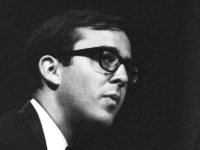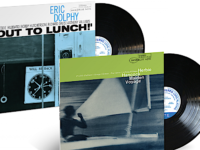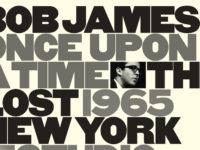The mid-1963 studio sessions led by Eric Dolphy birthed a couple of albums that pointed the way toward this visionary reedist and flautist’s magnum opus Out To Lunch! recorded in February 1964. The Alan Douglas-produced July 1963 recordings spun off Conversations and Iron Man, widely regarded as solid entries in Dolphy’s catalog that shone with Dolphy’s brilliance even as he still had potential unrealized, but there were a whole extra eighty-five minutes from those sessions that never previously saw the light of day.
Dolphy possessed tapes of these complete sessions but just prior to taking off for an extended run in Europe in 1964 from which he never returned (he died suddenly in June of that year), he left those tapes with some close friends and those belongings remained untouched for decades. Eventually, they were brought to the attention of producer Zev Feldman from Resonance Records in 2015 and with the cooperation of the Eric Dolphy Trust he began to master and package them for release. On January 25, 2019, Musical Prophet: The Expanded 1963 New York Studio Sessions from Resonance will finally be available for the general public.
Clearly, Resonance – and particularly Feldman – sensed that they’ve come across a Holy Grail of some sort, evident in the detail put into preparing this product. Musical Prophet is offered in both three LP and three CD forms and the physical discs come with an attractive, nearly 100-page booklet rich with black-and-white and color photos of Dolphy many of which have never been publicly seen before. These pictures are sprinkled in between interview excerpts from key persons who either knew Dolphy or whose own luminous careers were touched by him. That includes the only living sidemen on these recordings, Sonny Simmons and Richard Davis, but also meaningful perspectives and recollections from the likes of Henry Threadgill, Sonny Rollins, Joe Chambers, Han Bennink, David Murray, Dave Liebman, Bill Laswell and Steve Coleman.
There’s one more value added: the recordings — all taken by the only master tapes of the sessions known in existence — have been mastered in mono, the same way they were recorded. That includes the Conversations and Iron Man tracks that had long been available only in stereo form. I prefer the mono sound of the material already previously released; there’s a greater authenticity in the sound not found on those stereo versions.
The first heretofore unreleased tracks are tacked on to the end of the Conversations disc. Two versions of “Muse for Richard Davis” are, like “Alone Together,” Dolphy and Davis only, with Dolphy remaining on bass clarinet but Davis wields a bow for this ‘Sir’ Roland Hanna song. Davis shows the preciseness and elegance of a classical cellist and Dolphy tracks him closely, staying on the same wavelength.
The second disc is mostly the recordings that made up the Iron Man LP, one that has largely the same personnel as the all-covers Conversations (Prince Lasha, Sonny Simmons, Clifford Jordan, Woody Shaw, Bobby Hutcherson, Davis, Eddie Khan and JC Moses), but minus drummer Charles Moffett and adds Garvin Bushnell on bassoon. Except for Duke Ellington’s “Come Sunday,” these are all Dolphy originals; jazz rooted in bop but reaching out toward the freedom he’d find with Out To Lunch!.
The last disc is 100% new to the public, comprising of alternate takes of “Music Matador,” “Love Me,” “Alone Together,” Jitterbug Waltz”, “Mandrake” and “Burning Spear.” These discarded takes don’t lack in chops or even execution; I’d even argue that Dolphy’s alto sax solo on the first take on “Mandrake” has more sizzle than the one that made the LP, although the eighteen-year-old Shaw shows more creativeness on his trumpet solo in the accepted take. My personal favorite tune is the festive, south-of-the-border “Music Matador,” composed by Lasha and Simmons. The first take now revealed is only slightly less crisp overall than the one that made the cut but no less enjoyable; Simmons’ alto sax aside is more alive on the rejected version. But all of these alternate takes are so close in quality to their previously released counterparts that picking a preference is an exercise in splitting hairs.
Perhaps the most mind-blowing cut is the ‘bonus’ track at the end of Disc Two that was also part of the personal belongings Dolphy left with his friend Hale Smith just prior to departing for Europe and recorded in March 1964. “A Personal Statement” had appeared before, on Eric Dolphy – Other Aspects released back in ’87, but with no description or story behind it. Now, we know it. “A Personal Statement” was composed by none other than Bob James, lyrics and all, which is actually a libretto showcase for James’ former college classmate and vocalist David Schwartz, who sings James’ words railing against Jim Crow laws that were still pervasive in the South at that time. James also plays piano, accompanied by Ron Brooks on bass and Robert Pozar on percussion. But you can’t ignore Dolphy’s prowess, channeled through a strong performance first on alto sax, then bass clarinet and finally, flute, with some of his expressions made in response to the verses sung by Schwartz. The one-off recording is a fascinating intersection between an avant-garde god and a future smooth jazz king.
For those who are Eric Dolphy fans, Musical Prophet is a required purchase. Through music, words and photos, this constitutes the most significant addition in a very long time to the catalog of — and insight into — this brilliant but enigmatic figure of mind-expanding jazz.




